
by admin | May 25, 2021 | World
 Moscow : The US’ latest batch of sanctions targeting Russian businesses and China undermine global stability and are akin to playing with fire, officials here said on Friday.
Moscow : The US’ latest batch of sanctions targeting Russian businesses and China undermine global stability and are akin to playing with fire, officials here said on Friday.
Deputy Foreign Minister Sergei Ryabkov’s comments came after Washington on Thursday imposed a new batch of sanctions, hitting 33 of Russia’s most high-profile citizens with ties to the Kremlin.
Ryabkov said the sanctions were aimed at Russian defence organizations, politicians and businessmen.
“It would be good for them to recall the notion of global stability, which they recklessly upset by whipping up tensions in Russian-US relations,” Ryabkov said in a statement cited by TASS news agency. “It’s foolish to play with fire, because things could get dangerous.”
“We’ve been keeping a close eye on how the US applies it sanctions against our country. This seems to have turned into some sort of national sport, with yesterday’s anti-Russian measures becoming the 60th since 2011.
“Every new round of sanctions shows that our enemy’s previous attempts to pressure Russia have failed to yield any result. Numerous US blacklists duplicate each other more and more. That’s funny, but this is true,” the minister said.
Among the blacklisted people was billionaire mogul Yevgeny Prigozhin, known as “Putin´s chef” and allegedly responsible for orchestrating the digital fake news campaign against the US.
The security and military businesses targeted by the sanctions included the Wagner Group, a private security company which Moscow allegedly use in their Syria operations; Oboronlogistika 000, responsible for feeding and transporting Russian troops in Crimea and KnAAPO, an aircraft manufacturer.
China was also targeted in the new wave of sanctions for buying weapons from a previously blacklisted Russian arms dealer.
“We recommend that Washington’s operators of the sanctions machine at least superficially acquaint themselves with our history to stop going round in circles,” Ryabkov said.
—IANS
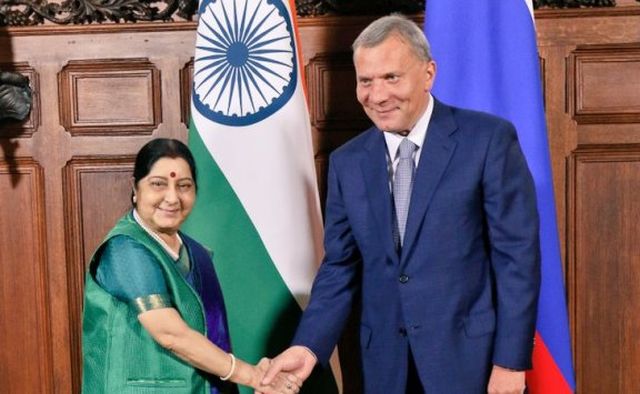
by admin | May 25, 2021 | Corporate, Corporate finance, Corporate Governance, Finance, Investing, News, Politics
 Moscow : India and Russia have set a new two-way investment target of $50 billion by 2025 following a meeting between Indian External Affairs Minister Sushma Swaraj and Russian Deputy Prime Minister Yury Borisov here on Friday during which bilateral cooperation across various sectors was reviewed.
Moscow : India and Russia have set a new two-way investment target of $50 billion by 2025 following a meeting between Indian External Affairs Minister Sushma Swaraj and Russian Deputy Prime Minister Yury Borisov here on Friday during which bilateral cooperation across various sectors was reviewed.
Addressing the media after co-chairing with Borisov the 23rd India-Russia Inter-Governmental Commission on Technical and Economic Cooperation (IRIGC-TEC), Sushma Swaraj said in 2017, the annual trade between India and Russia reached $10.17 billion.
“We discussed ways and means to increase this momentum, ensure balanced trade and remove barriers to trade,” she said.
“Two-way investments have already crossed the $30-billion target, which we had set for 2025.
“We have therefore proposed that we enhance this figure to $50 billion by 2025.”
IRIGC-TEC is a standing body which annually meets and reviews ongoing activities of bilateral cooperation.
The Commission, after taking stock of bilateral cooperation in various fields, provides policy recommendations and directions in the fields concerned.
Friday’s meeting prepared the groundwork for the annual India-Russia bilateral summit between Indian Prime Minister Narendra Modi and Russian President Vladimir Putin, to be held in New Delhi next month.
Russia is one of only two countries with which India holds annual bilateral summits, the other being Japan.
The India-Russia bilateral relationship was elevated to Special and Privileged Strategic Partnership in 2010.
Modi and Putin have already met twice this year — at an informal summit in the Russian resort city of Sochi in May and then on the sidelines of the BRICS (Brazil, Russia, India, China and South Africa) Summit in South Africa in June.
In her address, Sushma Swaraj said in the IRIGC-TEC meeting, both sides discussed the possibilities of working together on projects in third countries as a new dimension of the strategic partnership.
Pointing out that there has been significant expansion in cultural and tourism exchanges, she said: “Tourism flows in both directions has shown impressive growth. We are working on further liberalising visa regulations on both sides.”
In this connection, she also welcomed the initiative of the Russian government to enable electronic visas for Indian nationals visiting the Russia “far east”.
With energy being traditional area of cooperation, Sushma Swaraj said that earlier this year the first shipment of liquefied natural gas (LNG) from Russia reached India “in a new breakthrough of our energy partnership”.
“We have identified new areas of cooperation such as agriculture, infrastructure, transport and science and technology,” she said.
“We would like to expand our cooperation in the area of space.”
The Indian Minister also said that both sides have agreed to organise the first-ever India-Russia Business Summit involving major companies from both countries in early October in India.
Soon after her arrival here on Thursday, Sushma Swaraj met Russian Foreign Minister Sergey Lavrov and according to Indian External Affairs Ministry spokesperson Raveesh Kumar, both leaders had a good exchange of views on bilateral and regional issues.
—IANS
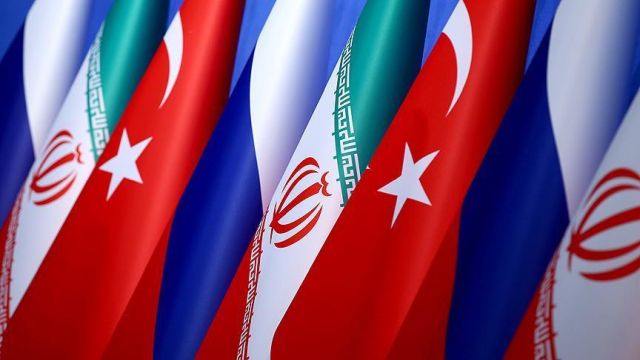
by admin | May 25, 2021 | Business, Emerging Businesses, SMEs, World
 Tehran : Turkey, Russia, and Iran have agreed to use their local currencies for trade between the three countries, according to Central Bank of Iran Governor Abdolnaser Hemati on Saturday.
Tehran : Turkey, Russia, and Iran have agreed to use their local currencies for trade between the three countries, according to Central Bank of Iran Governor Abdolnaser Hemati on Saturday.
Hemati told the media a meeting with the administrators of Turkish and Russian Central Banks is expected in the near future and he hopes the agreed topics would rapidly come into effect.
The governor termed the meetings in Tehran that saw the participation of Russian President Vladimir Putin and Turkish President Recep Tayyip Erdogan during the trilateral summit on Syria as fruitful.
He said they had agreed on the trade of petroleum, gas, and fundamental products, and also agreed on some banking issues.
The three countries agreed the US dollar should not be used for trade, Hemati said. He added that transactions will be made over designated currency exchange rates.
A trilateral summit on Syria was held in Tehran on Friday by Turkish, Russian and Iranian leaders.
—AG/UNA-OIC
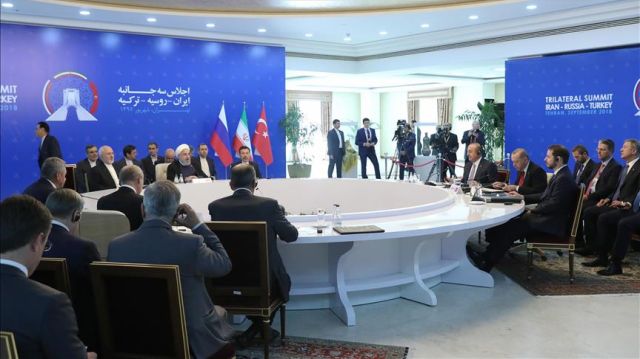
by admin | May 25, 2021 | Business Summit, Events, Muslim World, Social Round-up

President of Turkey Erdogan, President of Iran Rouhani and President of Russia Putin attend trilateral summit on September 7, 2018 in Tehran, Iran.
By Satuk Bugra Kutlugun,
Ankara: Turkey, Iran, and Russia on Friday called for a political solution to the crisis in Syria in a joint statement issued at the end of a trilateral summit in the Iranian capital Tehran.
“There could be no military solution to the Syrian conflict and it can only end through a negotiated political process.
“[They] reaffirmed their determination to continue active cooperation with a view to advancing the political process in consistence with the decisions of the Syrian National Dialogue Congress in Sochi and the UN Security Council Resolution 2254,” the statement said.
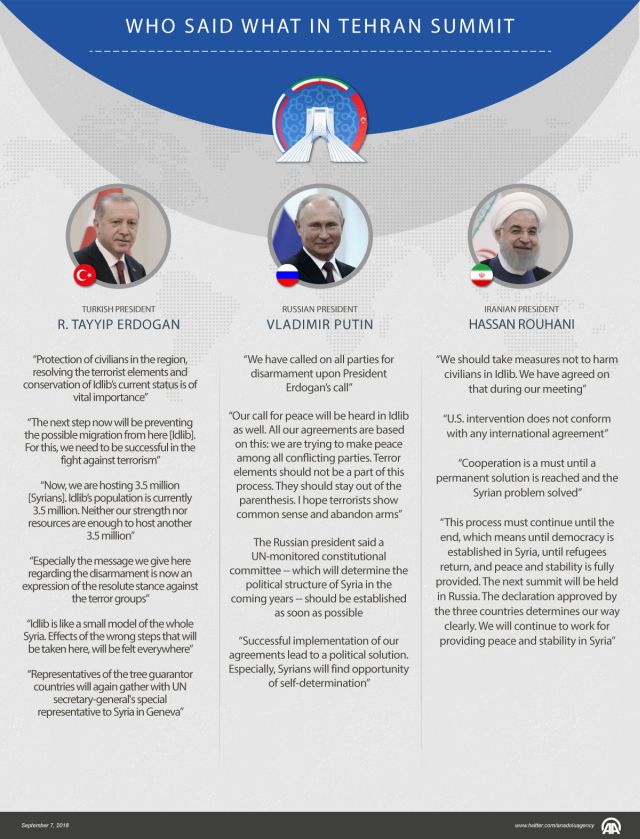
The leaders expressed their “satisfaction with the achievements” of the Astana format since January 2017, in particular, the progress made in “reducing violence across the Syrian Arab Republic and contributing to peace, security, and stability in the country.”
Iran, Turkey and Russia “emphasized strong and continued the commitment to the sovereignty, independence, unity and territorial integrity of Syria, as well as to the purposes and principles of the UN Charter and highlighted that they should be respected by all.”
The leaders “rejected all attempts to create new realities on the ground under the pretext of combating terrorism,” while expressing determination to stand against separatist agendas aimed at undermining the sovereignty and territorial integrity of Syria and national security of neighboring countries.”
The joint statement said the leaders highlighted the “need to create conditions for the safe and voluntary return of refugees and internally displaced persons (IDPs) to their original places of residence in Syria.”
Russia, Iran, and Turkey also called for the United Nations and its humanitarian agencies to help Syria by providing additional humanitarian aid.
The joint statement also welcomed the progress in the work of the Working Group on the release of detainees and abductees, and handover of the bodies as well as the identification of the missing persons, as undertaken with the participation of the UN and ICRC experts.
The next tripartite meeting will be held in Russia, upon the invitation of President Putin.
—AA
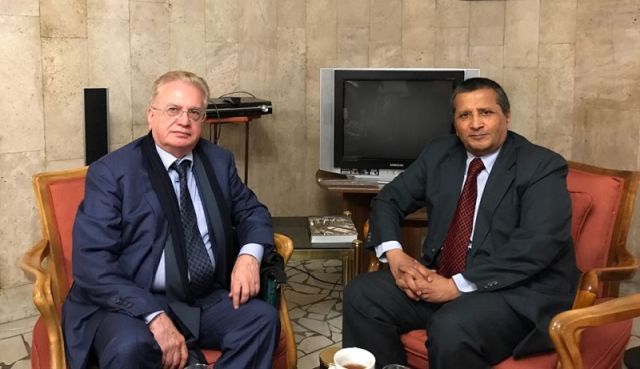
by admin | May 25, 2021 | Muslim World
 Moscow : President of the Union of Museums of Russia Mikhail Piotrovsky, who is also the director of the State Hermitage Museum, confirmed that his country will work hard via the United Nations Educational, Scientific and Cultural Organization (UNESCO) on banning trading in Yemeni smuggled antiques, and resending them to Yemen.
Moscow : President of the Union of Museums of Russia Mikhail Piotrovsky, who is also the director of the State Hermitage Museum, confirmed that his country will work hard via the United Nations Educational, Scientific and Cultural Organization (UNESCO) on banning trading in Yemeni smuggled antiques, and resending them to Yemen.
In a meeting here on Monday with Yemen’s Ambassador to Russia Dr. Ahmad al-Wahishi, Piotrovsky was briefed on damages hit Yemeni historical and antique monuments as the greatest witness on catastrophic situations left by Houthi militia’s war. Al-Wahishi pointed out that the Yemeni manuscripts, antiques and antiquities, which have been looted and smuggled, date back to thousands of years.
Piotrovsky, who also chairs the Russian-Yemeni Friendship Society, made it clear that many committees in the UNESCO’s International Museum Council’s meetings suggested banning selling smuggled antiquities from heritage-rich countries and trading in them in international markets. He reviewed activities to be organized by the Hermitage Museum in Saint Petersburg on the 90th anniversary of the Russian-Yemeni Friendship.
—AB/UNA-OIC

 Moscow : The US’ latest batch of sanctions targeting Russian businesses and China undermine global stability and are akin to playing with fire, officials here said on Friday.
Moscow : The US’ latest batch of sanctions targeting Russian businesses and China undermine global stability and are akin to playing with fire, officials here said on Friday.




